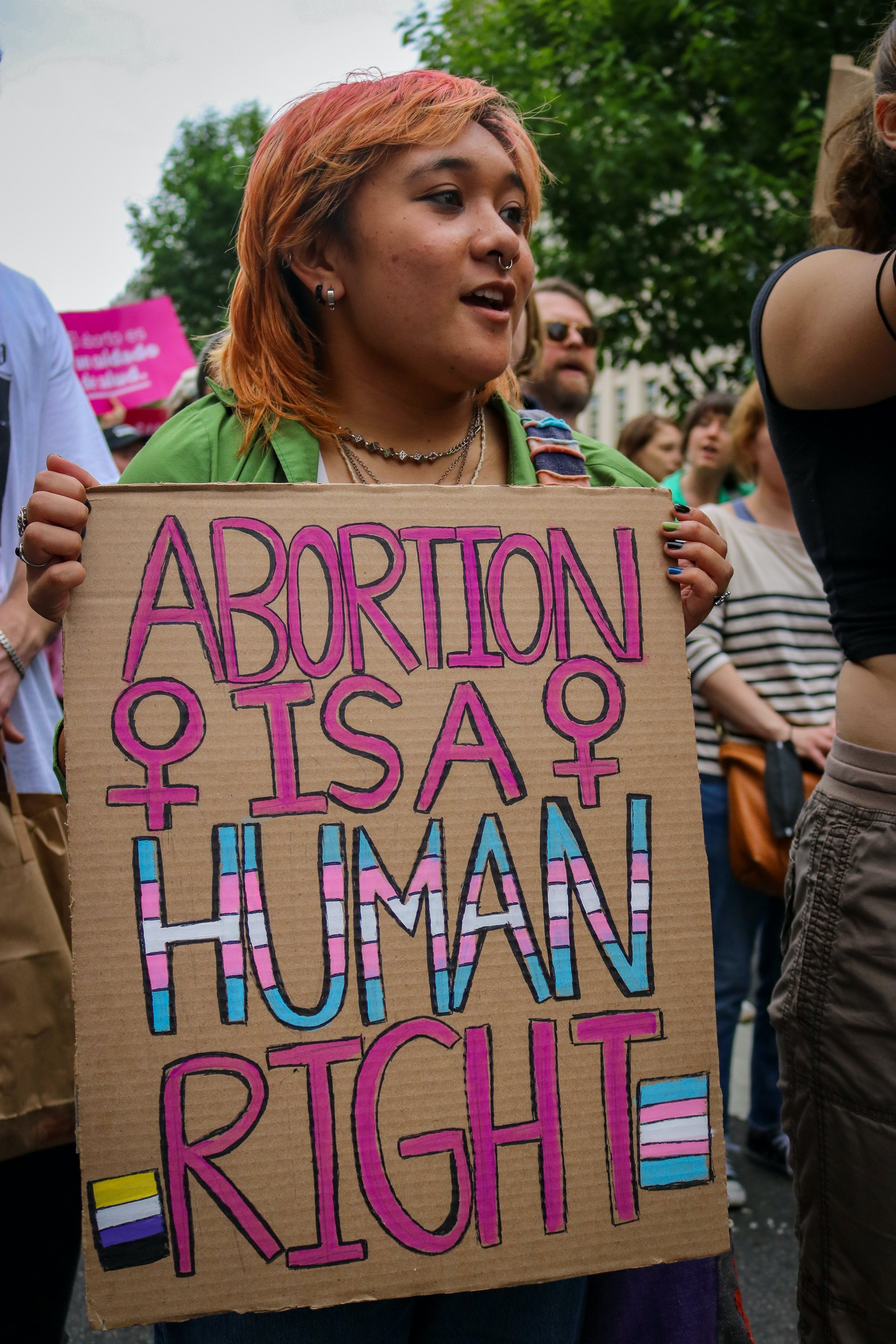Empower U: Mobilizing College Students for Reproductive Justice
By Kaytlyn Tyler
Fall 2023

Have you ever stopped to think about the profound impact that the overturning of Roe v. Wade had on our generation? It's like we've been handed the reins to a narrative that's evolving right before our eyes. As we juggle exams, student loans, and late-night study sessions, the landscape of reproductive rights is shifting beneath us and this can feel very overwhelming considering how much is already on our plates.
You may be thinking, you've got your hands full, and there's only so much one college student can do. The truth is, you're not alone in feeling the weight of these shifting tides. Meet an anonymous graduate student pursuing her Master's Degree in Education, Curriculum, and Instruction. In the third week of her program in 2018, she faced an unexpected pregnancy, navigating the complexities of abortion during her academic journey. Her story is just one example of the challenges students like you may encounter. That's why I’ve written a blog post designed with students like you in mind. This article is more than just a resource; it's a call to action for young people who are passionate about reproductive justice and a safe space for those who have had abortions. I know and understand that you’re not just the future; you’re the driving force of change in the present.
This article provides strategies, tools, and action plans, empowering you to make a real impact within your community and nationwide. Together, let's rise to the challenge because the story of reproductive justice demands our voices and actions – and you have the power to be a catalyst for change.
Understanding Reproductive Justice: An Ever-changing Landscape
In the timeline of reproductive justice, we journey back to the early 20th century with suffragists championing body autonomy. A pivotal shift occurred with Griswold v. Connecticut, making contraception legal, and later, Roe v. Wade in the '70s. Yet, from the '80s onward, deliberate actions sought to restrict access, leading to the recent overturning of Roe in 2022, a step backward for reproductive rights.
Enter "reproductive justice," a relatively new term shaking off the old labels like "reproductive rights" or "access to care." Dr. Chod sheds light on reproductive justice, emphasizing that understanding it means acknowledging that access to care is both an equity and justice matter.
For us college students, it's about recognizing how intersecting identities can affect not only access to reproductive care but also the outcomes. According to the Center for Reproductive Rights, “Today in the U.S., maternal mortality is rising, with disproportionate impacts on Black, Indigenous, and other people of color.” As college students, we must be aware that reproductive justice can only be achieved through working towards not only supplying useful resources to grant people the access they need but also simplifying the process to decrease the current racial and identity-based inequities that arise when people receive care.
Consider the experience of an anonymous source, a college student facing an unexpected pregnancy. Because of the stigmas from her upbringing and the lack of straightforward options, she felt driven to consult an herbalist to induce a miscarriage instead of seeking a professional abortion procedure. Her story underscores how the intersection of identities, compounded by societal pressures, can lead individuals to make choices outside the conventional healthcare system. Dr. Chod emphasizes that while "there are more resources than ever to figure out 'What do I need and how do I get it,' it doesn't entirely solve the access issue." Closing that gap requires the justice component, essential for bridging this divide.
As we juggle exams, student loans, and late-night study sessions, the landscape of reproductive rights is shifting beneath us and this can feel very overwhelming considering how much is already on our plates.
Interested in Learning More?
Here are some sources that can help:
● Planned Parenthood's Abortion Clinics Information: Explore Planned Parenthood's resources to learn more about accessing abortion clinics near you. Gain valuable information and support for reproductive healthcare.
● Guttmacher's Interactive Map Guide: Delve into Guttmacher's real-time interactive map, a comprehensive guide to abortion policies in every U.S. state. Understand the intricate terrain of abortion laws, enabling informed decision-making and advocacy.
● Center for Reproductive Rights' Global Perspective: Visit the Center for Reproductive Rights to understand the global significance of abortion care as a fundamental human right. Explore their efforts in challenging restrictive laws, defending individuals, and advocating against rollbacks to reinforce the importance of reproductive autonomy.
● National Women's Law Center Initiatives: The National Women's Law Center believes that everyone, regardless of their financial means, deserves legal representation if they have needed abortion care or have supported someone in obtaining it. To ensure inclusive access to legal representation, the Abortion Access Legal Defense Fund expands resources for those who may not otherwise be able to defend themselves.
● Advocates for Youth's Justice Initiatives: For students passionate about advocacy, justice initiatives, and reproductive rights, explore the work done by Advocates for Youth. Learn about action-oriented initiatives and stay engaged in the fight for reproductive rights and justice.
The ongoing fight for reproductive rights and justice persists, and students wield the power to shape their trajectory through informed advocacy and direct action.
Campus Voices: Amplifying Student Perspectives on Reproductive Rights
In the following section, we reintroduce our anonymous source—a graduate student boldly sharing her journey of receiving an abortion while pursuing a Master's Degree. As we delve into her narrative, we strive to foster empathy, understanding, and open dialogue that transcends societal norms, recognizing the importance of sharing diverse stories to break down barriers and build a more supportive community. Storytelling about abortion care reduces the stigma surrounding the issue, exposes people to perspectives unlike their own, and opens more opportunities to receive the support they need. According to Dr. Chod, “As we know, in equity work especially, storytelling is a powerful tool… If you share your story it might inspire one, or two, or ten people to share their own and build a community.”
To elaborate more on her upbringing, she grew up in a Catholic and “very conservative” household, creating lots of shame around the topic of abortion in general. She claims that if her family had found out about receiving this form of care “it would have been very shameful.” She expands by discussing that her sexual partner was not present because of his involvement in the military. He found out she had gotten pregnant “and got shipped off to Afghanistan the next day and wasn’t even around and could not fathom the situation.”
In terms of how this person felt when she found out she was pregnant, she claims that “it was a shock. I didn't think anything was wrong at all whatsoever. I was on birth control and I wasn’t even worried about it. I missed my period and it wasn’t a big deal because that happens every now and again.” After talking to her sexual partner, he felt this was a big enough deal for her to take a test and the results came back positive. At first, she felt like it was a sick joke as she read the result back to him over a FaceTime call.
When recalling her experience of falling pregnant, she said, “It was bad. I felt really lost. I definitely felt alone. My only friend [friend’s name], I had just started getting to know her. I was introduced to her by a mutual friend so I didn’t even know her that well. My friend forced me to tell [her] about it so I would have somebody and it ended up being a good thing and she was a really good friend and support person for me but it was still really hard.” In arriving at her choice not to proceed with the pregnancy, she expresses, “I will never feel okay with my decision but I would have never made a decision other than that. It will never feel like [having a child was] the right thing to do, to me. I couldn’t have lived my life that way at that time.” This response shows how difficult of a decision it was to grapple with given the circumstances. The anonymous source emphasized that the ingrained stigma from her upbringing significantly contributed to the negative emotions she associates with the subject.
Judgment surrounding this topic contributes to an emotional and psychological burden on individuals who have had or are considering abortion. Stigmatization may deter individuals from seeking timely and safe reproductive healthcare, potentially leading to complications or resulting in a “$500 ER visit that was unnecessary” according to my anonymous source. When faced with judgment or stigmatization, some individuals may resort to unsafe alternatives, such as attempting self-induced abortions or seeking care from unqualified providers. The anonymous source says “I went through everything online that said could induce a miscarriage” so she wouldn’t have to seek out the procedure at the clinic. She continues, “I went to the extreme of seeing an herbalist and paying them $60 to make me this tea to end my pregnancy”. By fostering a nonjudgmental environment, we can empower individuals to make informed choices and seek professional care, ultimately reducing the risks associated with unsafe alternatives and promoting a society that values compassionate and respectful reproductive health services.
Opportunities to share first-hand accounts of college students who have had abortions such as this one emphasize the importance of breaking down societal taboos, fostering empathy and understanding, and advocating for comprehensive reproductive healthcare that prioritizes nonjudgmental support for individuals navigating their unique reproductive choices and experiences. If you are interested in sharing your story, “[The National Abortion Federation] is interested in hearing about your experience”.

Reproductive Rights on Campus: 5 Action-Oriented Strategies for Students
Now that we've dug into the roots of this movement and connected with those who've navigated abortion experiences, let's check out some action-packed strategies that give you the tools to kickstart change right in your community.
1. Campus Advocacy Initiatives
Embarking on the path of campus advocacy for reproductive justice is undoubtedly a journey that can feel daunting at first. Picture this: a student, sitting in a lecture hall, overwhelmed by the urgency to make a difference but unsure where to begin. Dr. Suzanne Chod, Professor of Political Science at North Central College, emphasizes the power of that initial spark, the realization that "I have to do something, but I don't know what to do." The crucial first step? Reach out to someone you trust, someone with institutional knowledge, and earnestly ask, "What do we do?" This person becomes the catalyst, setting the wheels in motion.
As Dr. Chod wisely notes, it just takes one person with passion and persistence, and a supportive ally to push them along. But let's be real—it's not a walk in the park. It requires sacrifices of time and emotional energy. However, if that inner call to action resonates, if you feel the urgency because no one else is stepping up, here's some advice: find someone you trust on campus. Ask about existing groups focused on reproductive justice, and if there isn't one, consider taking the plunge to start your own. The power to effect change lies within, and with a trusted ally and a touch of courage, students can carve a meaningful path toward reproductive justice on their campus.
2. Start a Campus Chapter with Existing Organizations
Embarking on the journey of reproductive justice activism on your college campus can start with the invaluable step of connecting with regional and national organizations. As a student, it might seem like a daunting task to initiate change, but the wealth of resources, programming initiatives, and connections that come from established national organizations is a game-changer. Dr. Chod emphasizes the power of affiliating with these organizations, allowing for institutional recognition, budget allocation, and a solid foundation for your advocacy efforts.
Furthermore, Laura Welch, President of the Illinois National Organization for Women, highlights the importance of reaching out to existing chapters in states where reproductive rights may face challenges. Even in regions where abortion is restricted, the fight persists, and the energy of young activists is invaluable. Consider starting a chapter on your campus, choosing issues that resonate with you within the organization's core values. If the organization doesn't have a presence on your campus, take the initiative to start one – you might find that other students that have been waiting for this opportunity. The key is to explore, connect, and make your voice heard on the broader stage of reproductive justice advocacy.
3. Community Involvement in the Online Space
Engaging in community involvement for reproductive justice doesn't necessarily mean physical presence; it can be just as impactful in the vast expanse of the online space. With Gen-Z being the digital natives and the social media generation, chances are you're already connected to issues that matter to you. The key is taking that extra step, utilizing the algorithm's assistance, and reaching out to those in your community who share your interests. Dr. Suzanne Chod emphasizes the pivotal role of social media in staying connected to community happenings. Following and interacting with organizations and causes on social media keeps you informed and connected to like-minded individuals. Taking the extra step, such as reaching out to express your desire to get involved, opens the door to countless opportunities. Whether you're a young person who opted not to go to college, a post-college graduate, or simply uninterested in starting a club on campus, the power of the internet allows for impactful contributions. Laura Welch, President of the Illinois National Organization for Women, points out the array of online opportunities outlined below for participation:
Post-card writing: Engage in impactful advocacy by writing post-cards on specific issues. Many organizations provide online materials to facilitate this process.
Email campaigns: Join online campaigns by writing emails to support reproductive justice causes. Organizations often offer materials and guidance for effective advocacy.
Phone banking: Contribute to the movement by participating in phone banks. This online activity allows individuals to make a difference from the comfort of their homes.
Virtual events: Attend smaller online events that focus on reproductive justice. Organizations like Red Wine and Blue conduct webinars, providing educational opportunities and insights.
Social gatherings: Foster a sense of community by organizing casual gatherings with friends. Whether it's ordering pizza or watching a movie, these activities can be coupled with advocacy efforts like postcard writing or phone banking for particular issues or upcoming elections.
With just a few minutes, you can make a difference from the comfort of your home. The internet has become a dynamic space for activism, allowing you to participate in movements, connect with activists, and contribute to the fight for reproductive justice on your own terms. The website Mobilize is a great resource for finding virtual volunteer opportunities as listed above. Even with just five minutes to spare, students can make a significant impact by participating in these online activities, demonstrating that every contribution matters.
4. Donate a few dollars to where it matters most
For college students with hectic schedules, making a difference in the reproductive justice movement doesn't always require hands-on involvement. Donating money to organizations like Planned Parenthood or national abortion funds emerges as a potent avenue. Dr. Suzanne Chod, a Professor of political science, emphasizes the ongoing need for financial support and awareness, especially in the post-Roe era. These funds contribute to essential services, ranging from clinic escorting to providing bail for those facing criminalization. Even with a federal law in place, there remains a need to address the persistent challenges faced by specific individuals operating in the shadows. Laura Welch, President of Illinois NOW, sheds light on innovative initiatives like the Elevated Access program, where pilots use private planes to transport individuals for gender-affirming care and abortions in states with restrictive bans. Donating money becomes another avenue for students to play a role in supporting these crucial services, ensuring that access to reproductive care transcends geographical and legal barriers.
Call to Action
Ignite change by supporting Planned Parenthood's vital mission. Their commitment to fostering full, healthy lives, regardless of income, identity, or background, aligns with values of inclusivity and respect. Your contribution fuels high-quality sexual and reproductive health services, ensuring all individuals receive the care they deserve. Planned Parenthood tirelessly advocates for policies safeguarding reproductive rights and comprehensive healthcare access, including crucial services like abortion. By donating, you empower the dissemination of medically accurate education, promoting understanding of human sexuality, relationships, and autonomy. Join the cause, advancing research and technology that enhances reproductive health. Make an impact — donate here to Planned Parenthood and champion reproductive justice!
Kaytlyn Tyler, a dynamic student at North Central College, is shaping a future defined by passion and advocacy. Majoring in marketing with a minor in political science and a concentration in ethical leadership, Kaytlyn is the President and Founder of North Central College's NOW Campus Action Network. As an intern at Turn Up Activism and a Welcome Team Organizer with Generation Ratify, she channels her energy into impactful initiatives. From organizing voting initiatives and Take Back the Night marches to leading a pro-choice rally, Kaytlyn's leadership mobilized over 200 community members for pro-choice candidates in the 2022 midterm elections. Her experiences in Milan and at the NOW Conference in Washington DC have fueled her commitment to effecting positive change. Kaytlyn's dream is to mobilize young people to make positive change not only with reproductive justice initiatives but also in creating a future that is more inclusive and hungry for progress.


